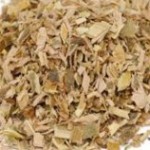The protein AMPK (AMP-activated protein kinase) is a key player in regulating cell growth and metabolism. It is emerging as an important modulator of energy metabolism in cancer cells and thereby regulating their growth. AMPK is a fuel sensing enzyme (cellular fuel-gauge) that is activated by hormones, cytokines, exercise, and stresses that diminish cellular energy state (e.g., glucose deprivation).
AMPK is activated during periods of stress conditions such as hypoxia (low oxygen supply to a tissue), ischemia (reduction in blood flow to a tissue) where the intracellular AMP level or the ratio of AMP to ATP is increased. It shifts the metabolism of cells from an anabolic to a catabolic state in order to maintain their survival. This means that the synthesis of cholesterol, fatty acids and triglycerides, cell cycle inhibition, and apoptosis are inhibited.
AMPK is also switched on by the commonly used anti-diabetic medication metformin. Thus, decreases in AMPK activity are associated with insulin resistance, which can be improved by activators of AMPK. Therefore, the activation of AMPK promotes fatty acid oxidation to generate more ATP in coping with acute energy demand and inhibits ATP-consuming processes such as lipid and protein synthesis to preserve energy for cell surviving program. Investigations have demonstrated that prostate cancer cells require high rates of fatty acid and protein synthesis for their invasive growth and survival.
Reversely, the inhibition of AMPK accelerates cell proliferation and promotes malignant behavior such as increased cell migration and anchorage-independent growth. The inactivation of AMPK alters gene expression and promotes growth of prostate cancer cells and its activation suppresses their growth.
AMPK: a key regulator of energy balance in the single cell and the whole organism.
Endocrine-related cancers and the role of AMPK.
AMPK, the metabolic syndrome and cancer.
Metformin: a new option in cancer treatment.
Inactivation of AMPK alters gene expression and promotes growth of prostate cancer cells.
AMPK also inhibits the activity of mTOR, a known suppressor of autophagy. Autophagy is tightly controlled by the mTOR-dependent signal transduction pathway. It is an essential, homeostatic process by which cells break down their own components (proteins and cellular organelles). Perhaps the most primordial function of this lysosomal degradation pathway is adaptation to nutrient deprivation (to provide emergency nutrients for the starved cells). It not only allows for cell survival in times of metabolic stress with nutrient recycling but also is able to lead to cell death when required.
Autophagy has dual roles in cancer, acting as both a tumor suppressor by preventing the accumulation of damaged proteins and organelles and as a mechanism of cell survival that can promote the growth of established tumors.Thus, AMPK-mediated autophagy is a survival mechanism in prostate cancer to escape from an androgen-deprived and hypoxic subsistence. Tumor cells activate autophagy in response to cellular stress and/or increased metabolic demands related to rapid cell proliferation. If AMPK-mediated autophagy is prolonged, the prostate cancer cells will die of programmed death.
Autophagy: regulation by energy sensing.
The role of autophagy in cancer: therapeutic implications.
AMP-activated protein kinase and autophagy.
Autophagy as a target for anticancer therapy.
Both salicylates (the active ingredient in aspirin) and metformin activate AMPK. Salicylates and metformin increase autophagy, as well as inhibition of mTOR and Akt (a key player in cancer). These features led scientists to test its use as an anticancer drug. Unfortunately, metformin is a prescription drug and has certain side effects. Salicylate is derived from willow bark, and is believed to be one of the oldest drugs in the world.
 Unlike aspirin, the salicylates in willow bark do not increase the risk of bleeding. They do not usually irritate the lining of the stomach. For these reasons, willow bark may be useful for people who have cancer but cannot take NSAIDs or COX-2 inhibitors. The analgesic action of willow bark depends on symbiotic or “friendly” intestinal bacteria to digest its components into painkilling forms. Aspirin does not require digestion by intestinal bacteria, and works more quickly. Willow bark, on the other hand, continues to provide pain relief longer than aspirin. ProstaZym contains the purest, most highly bioavailable fermentd willow bark extracts.
Unlike aspirin, the salicylates in willow bark do not increase the risk of bleeding. They do not usually irritate the lining of the stomach. For these reasons, willow bark may be useful for people who have cancer but cannot take NSAIDs or COX-2 inhibitors. The analgesic action of willow bark depends on symbiotic or “friendly” intestinal bacteria to digest its components into painkilling forms. Aspirin does not require digestion by intestinal bacteria, and works more quickly. Willow bark, on the other hand, continues to provide pain relief longer than aspirin. ProstaZym contains the purest, most highly bioavailable fermentd willow bark extracts.
The ancient drug salicylate directly activates AMP-activated protein kinase.
Policosanol (especially triacontanol), demethoxycurcumin (an active compound of turmeric), resveratrol, apigenin, fisetin (a flavonoid found in plants and fruits, especially strawberries and mangoes) and geraniol (a naturally occurring scent ingredient found in various essential oils such as rose oil and citronella oil) also powerfully activate AMPK signaling, resulting in mTOR inhibition and induction of autophagy.
ProstaZym also contains policosanol (especially triacontanol), and CurcuZym contains most highly bioavailable demethoxycurcumin. It is possible to modulate AMPK activity in prostate cancer
Policosanol inhibits cholesterol synthesis in hepatoma cells by activation of AMP-kinase.